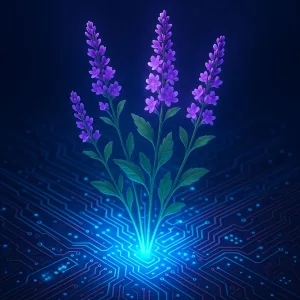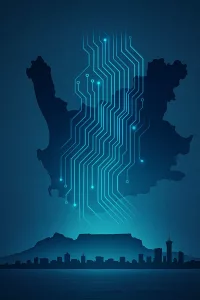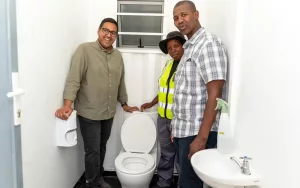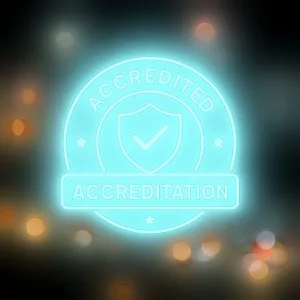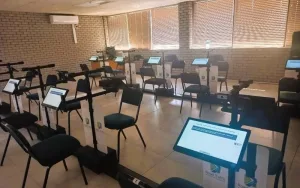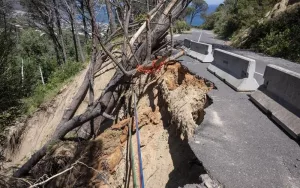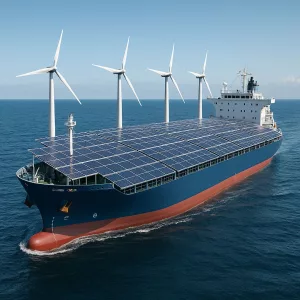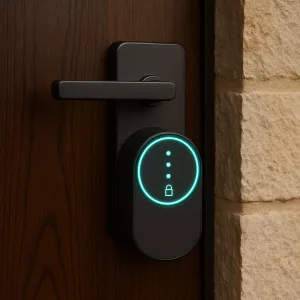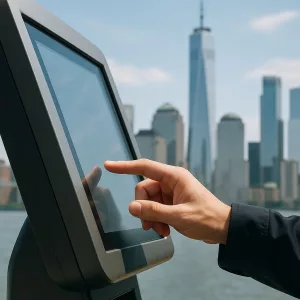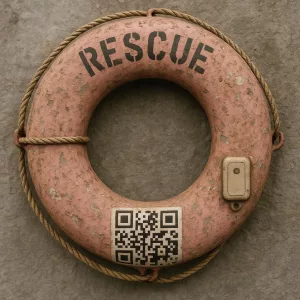Cape Town’s new Atlantis 7 MW Sun Farm is a shining example of cityowned power! Thousands of solar panels are now soaking up the sun, generating clean energy and cutting electricity costs. This amazing project is creating local jobs, using locally made parts, and even helping protect nature. It’s a bold step for Cape Town, showing how cities can power themselves with sunshine and build a brighter future.
Four South African teens stormed the Bali Science Fair, showcasing incredible innovations. Wium Van Niekerk created a lavenderbased biofungicide that outsmarted billionrand fungi. Ismaail Hassen’s “WalkMan” gave shoulders eyes for the visually impaired, spreading freedom of movement. Milla Vorster crafted 3Dprinted heart valves from cow tendon, while Dzunisa Chauke’s AI bot became a truth defender against fake voices. These young minds not only won top awards but are now poised to revolutionize their fields, proving that ingenuity knows no bounds.
Three Cape Town schools started a cool recycling project called “From Bottle to Breakthrough.” They turned plastic trash into a big community effort, using fun digital scoreboards to show how much everyone collected. Kids and parents worked together, learning about recycling in class and even making money from their efforts. This awesome idea is now inspiring others, showing how old bottles can become new, useful things for everyone.
{“summary”: “The Western Cape is building a \”digital twin\” of its public buildings and roads. This means creating a live, digital copy that uses sensors and data to predict problems and help with planning. It all started with a small grant of €97,500, showing how even a little money can kickstart big changes. This project will help the province manage its infrastructure better, making things last longer and run more smoothly.”}
South Africa is changing how people in places like Khayelitsha get clean toilets. They’re using new systems in shipping containers called “LoopFlush.” These smart units clean dirty water using sunshine and wind power. This means people get clean, private toilets even where there are no normal pipes and sewers. It’s bringing dignity and a better life to communities that really need it.
{“summary”: “Getting into the 2026 State of the Nation Address is super hightech now. A 4second computer program checks your info with government offices to see if you can come. They even use drones, special badges, and fancy internet to make sure everything runs smoothly and safely. If you want to tell South Africa’s story, you better be ready for this futuristic digital world!”}
Cape Town is throwing out old paper driving tests. Now, people will use cool touchscreen booths. These booths use fingerprints and have videos in many languages. This makes getting a license faster and stops cheating. It’s a big, smart change for everyone learning to drive.
Kloof Road, a beautiful shortcut in Cape Town, was badly broken by a big storm in 2023. It will take a long time and a lot of money to fix, with repairs starting in March 2026 and finishing in December 2027. Workers will rebuild the road from the ground up, using special tools and careful plans to work with nature. This big project will bring back an important road while also protecting the mountain’s plants and animals.
Strand is building a massive R620million wall along Beach Road to fight the ocean. This isn’t just a wall; it’s a smart, living fortress with giant concrete blocks called dolosse that tame waves and even create homes for sea creatures like mussels. The project is a dance between big machines, clever engineers, and the wild sea, transforming the coast into a safe and beautiful place that even hums like a giant instrument. It’s a huge effort to protect the land, and it’s even bringing new life and fun to the beach.
The French schooner, “Ville de Bordeaux,” sails into Cape Town not as a typical ship but as a vibrant, floating recycling factory. It transforms plastic trash into valuable items like building bricks and new plastic. More than just recycling, the ship becomes a buzzing center of learning, business, and innovation, hosting workshops and a venturecapital lounge. This amazing vessel aims to empower local communities and spark a circular economy, all working towards one big dream: making plastic waste disappear forever. It’s a bold mission to turn ocean pollution into a treasure chest of new possibilities, proving that yesterday’s trash can build tomorrow’s world.
Rich people’s fancy homes in Cape Town use secret tech to stay super safe. Special codes and sensors watch everything, from loud parties to tiny sounds in the ground. They even sniff the air for paint fumes! This clever tech stops trouble before it starts, keeping these amazing houses peaceful and their owners happy.
Cape Town’s Learner Licence Goes Fully Digital: 400,000 Annual Candidates Move to Touch-Screen Kiosks
Cape Town is making a huge leap! They’re ditching old paper tests for learner’s licenses and going all digital with cool touchscreen kiosks. This means no more long waits, less paper waste, and supersecure exams for everyone. It’s a big step forward, making getting your license easier, faster, and safer for 400,000 people each year!
South Africa’s rescue services are using amazing new technology this holiday season to keep everyone safe! They have smart maps that show every tiny detail, even beach towels. Drones fly above, watching for trouble and using social media pictures to find landmarks. They even have special buoys that teach you CPR with a QR code! This means faster help and fewer accidents, so everyone can enjoy the sun.
Bitcoin uses tons of electricity to create each coin. This energy use, called “ProofofWork,” makes Bitcoin super strong and hard to change, like a digital energy receipt. This makes it a great way for people worldwide to send money, especially when their local money is shaky. It helps them avoid high fees and changing money values, giving them a steady way to store wealth. This new type of money is built on physics, not politics, making it a powerful tool for those who need it most.
Cape Town’s Underground Metamorphosis: 49 Kilometres of Fresh Arteries for the Mother City
Cape Town is doing a massive underground makeover, replacing 49 kilometers of old water and sewer pipes with super strong new ones. Imagine tiny workers deep below your feet, battling old pipes and making everything fresh. This huge project, costing R589.5 million, means better water pressure, fewer leaks, and a super reliable system for everyone. It’s like the city is getting brand new veins and arteries, quietly making life better for everyone above ground.
Midnight Mirage: How Cape Town Quietly Turned a Sleepy Lagoon Into the World’s Most Audacious Urban Water ICU
Cape Town is turning a sleepy lagoon into a giant water hospital! They are using a huge machine called “Mvezo” to suck out 40 years of yucky mud. This will stop bad algae and make the water clean and fun again. This big cleaning project is a bold step to heal the lagoon, showing other cities how to fix their water problems too.


